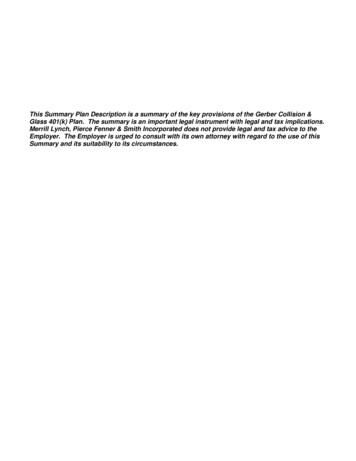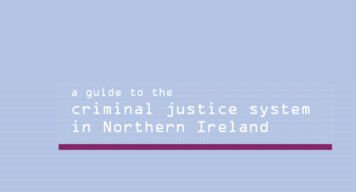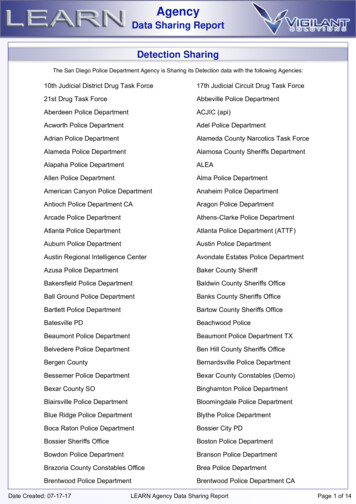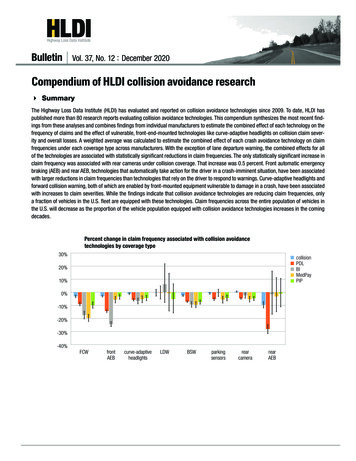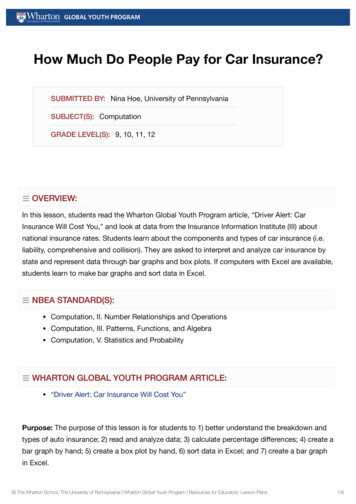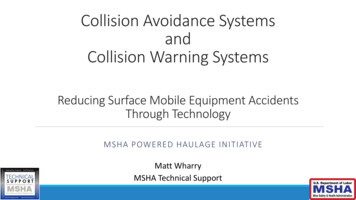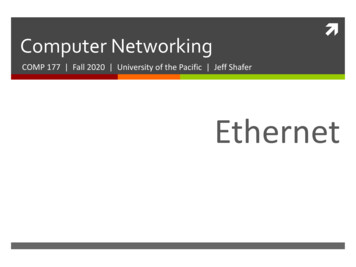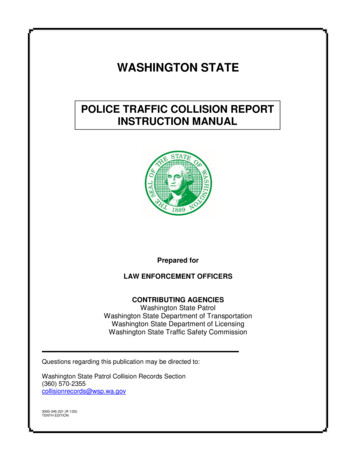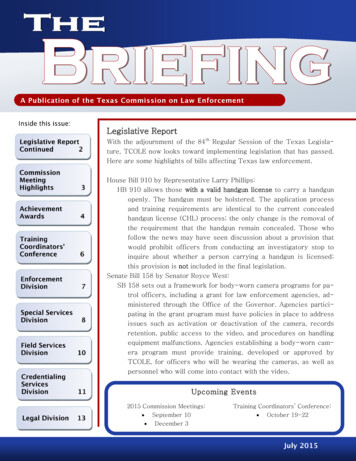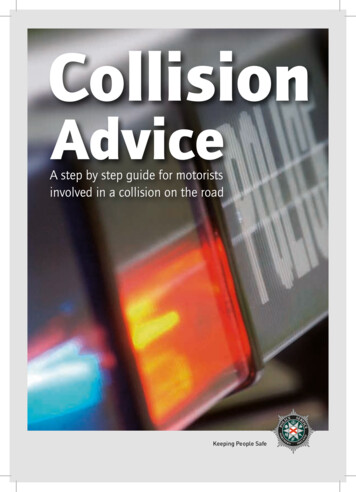
Transcription
CollisionAdviceA step by step guide for motoristsinvolved in a collision on the roadKeeping People Safe
ContentsOur service to you3What happens next?4Frequently asked questions6Take some details10If you have a complaint13Useful contact numbers14Police contact details15
Our service to youThe Police Service of Northern Ireland iscommitted to providing the best possibleservice to the public in relation to theinvestigation of road collisions.However, the PSNI does not investigateroad traffic collisions on behalf ofinsurance companies.Our primary role isA helping handThis booklet has been compiled as part ofour ongoing commitment to provide youwith the best service possible.It contains useful information about whereto go for help and advice and providesanswers to some of the most frequentlyasked questions.If you require specific information relatingto a collision, call the Police 101 and askfor “OCMT” in the area where the collisionoccurred To protect the scene from furthercollisions. To ensure the injured are treated. To ensure the free flow of traffic. To arrange the recovery of vehicleswhere appropriate. A section where you can make yourown notes. To investigate the collision to determinethe cause and whether offences havebeen committed. To provide assistance to those inneed at this stressful and sometimestraumatic time.A section for you to make a quicksketch plan of the scene to help youremember useful details like roadnames and house numbers.This will be useful if you are requiredto make a statement about whathappened at a later date. To investigate on behalf of the coronerin fatal collisions. To ensure safe custody of personalbelongings when required.For your conveniencewe have includedPass these details to your insurerand the Police if we conductan investigation.3
What happens next?You may have been given this booklet by Police following their attendance at a road trafficcollision or after you have reported a collision at the police station.In these circumstances the officer in charge of the case will have written his or her details intothe back of the booklet, together with the date and location of the collision.Alternatively you may have picked the booklet up from a police station. Keep it in the glovecompartment of your vehicle and use it if you are involved in a collision in the future.Non-attendance collisionPolice will not attend collisions where No injuries are reported; or A damage only collision has occurredand the parties have left the scene; or An animal has been injured and theinvolved parties have exchangeddetails.However, if you suspect the other driver hasbeen drinking or has no insurance or hasclearly committed an offence, then policeshould be informed of these facts.In the case of a non-injury collisioninvolving no allegations of any offencesand where the law in relation toexchanging particulars has been fullycomplied with, police will not normallyattend or prepare a report.In these cases, the Police will only makeout an incident log at the station to whichit is reported.In all other cases, the Police will compilea collision report in keeping with theseriousness of the occurrence.4Eye witness accountsThese are the statements of the peopleinvolved in a collision, or those who havewitnessed a collision, or the vehicles priorto a collision.You need to obtain the details of anyoneat the scene unconnected with anyvehicle involved, who may have seenwhat happened.If a statement is required you may beinterviewed later by a Police Officer.Normally we will complete an investigationin six weeks, but for a variety of reasonsthis can take longer, especially in cases ofdeath or serious injury.
What happens next?Driving documentsIf you were unable to produce your drivingdocuments (eg driving licence, certificate ofinsurance, test certificate) for examinationby police at the time of the collision, youwill be issued with a request to do so.This request will be either generatedelectronically by an officer and you will begiven a reference number or they will issueyou with a Driving DocumentsProduction Form (Form 55/8).The Form 55/8 will have been completedby the police officer at the scene. It will listthe documents you are required to produceat a police station you will have agreed on. You must do this within a maximumof SEVEN WORKING DAYS to complywith the law and avoid prosecution. It is essential you take the Form 55/8with you when you produce yourdocuments or have the referencenumber ready. If you have breakdown cover, the Policemay contact your recovery company onyour behalf. When circumstances dictate, and ifnecessary, a garage may be called tocarry out the recovery at your expense.For reasons of safety on the motorwaynetwork, no vehicles will be allowedto remain on the hard shoulder formore than 30 minutes. This can be a garage nominated by you(if readily available) or a garagenominated by our contracted recoveryagent. Where police use their powersto remove a vehicle it will be inaccordance with The Road TrafficRegulation (NI) Order 1997.Further information is available in theFAQ section of the PSNI website.www.psni.police.uk You must produce your driving licencein person.Vehicle removal from the scene ofa collision In the interests of road safety policemay require vehicles damaged in roadtraffic collisions to be removed from thescene as soon as possible.5
Frequently asked questions.Your questions answeredThe following pages will help answer someof the most frequently asked questionsfrom motorists involved in a road collision.To assist you, there is space on pages10 -12 in this booklet for you to makeyour own notes/sketch at the scene.Q: Should I inform my insurancecompany?Q: Do prosecutions follow inevery case?A: Yes. You must do this as soon aspossible and irrespective of whetheryou wish to make a claim or not.A: No. Police investigators are seeking totry and establish the facts about whathas happened. However, if it appearsthat a driver may have committed anoffence, they will be informed thatthey may be prosecuted. This may beverbally at the time, or in writing at alater date.Don’t worry if you do not possess all theinformation that may be required. Thesedetails will be provided on requestapproximately 14 days after the collisionby calling the “OCMT” in the DistrictCommand Unit for the area wherethe collision occurred.Q: What information will myinsurance company require?A: Date and time of collision. Names and addresses of allparties. Details of any witnesses.Once more, don’t worry if you are unable tosupply the insurers with all the informationthey require. This may be obtained laterfrom the Police after the collision reporthas been completed.6The purpose of a prosecution is tofind out if someone is guilty of anoffence and punish the offender.
Your questions answeredQ: Who decides to prosecute?Victim Support BelfastA: Prosecutions are recommended by thePublic Prosecution Service (PPS) wherethere is clear evidence of an offence.The PPS is an independent agencyresponsible for prosecuting cases incourt. They will make the decisionwhether or not to prosecute when theyhave examined the police report.Foyle Hub Office6th Floor, Embassy Building3 Strand Road BT48 7BH028 7137 0086foyle@victimsupportni.org.ukThe PPS will only proceed if there isenough evidence for a realistic prospectof a conviction.Decisions are made by PPS’s lawyerswho consider the law, the evidence andwhether it is in the public interest for aprosecution to be brought.The PPS is guided by the Code forProsecutors. You can get a copy fromtheir website or by contacting them(details on page 13).Q: Where can I get help andadvice if criminal chargesare to be brought?A: If your collision is likely to result incriminal charges being brought againstsomeone else, you may get help andsupport from the Victim SupportScheme. They can help you throughcourt procedures and trials.Belfast Office2nd Floor Albany House,73/74 Great Victoria StreetBelfast BT2 7AF028 9024 3133belfast@victimsupportni.org.ukOther useful agencies are listed at the endof this booklet on page 14.Q: How is a person charged orsummoned?A: If a court action is to be taken, a personmay be issued with a summons whichoutlines the alleged offence and theirrequirement to attend court to answerthe allegations.In certain circumstances a personmay be charged at a police station toappear before the court, but this verymuch depends on the circumstancessurrounding the particular case.Q: Where are cases heard?A: Depending on the charge, cases areheard in a: Magistrates’ Court orCrown Court.Serious charges are heard in the CrownCourt.7
Your questions answeredQ: Can I get further informationfrom the Police Officer whoattended the scene?A: No, not under normal circumstances.The officer who attended the collisionmay have completed a written reportat the scene and may have providedyou with contact details. However,this officer will have been part of anemergency response team who react to999 calls, 24 hours a day.It is vital that members of this teamare kept away from non-emergencyadministrative tasks wherever possibleand all such calls should be referred tothe “OCMT” in the District CommandUnit where the collision occurred.Allow at least 14 days from the date ofthe collision for all information to begathered.Q: Can I get a copy of the PoliceCollision Report?A: Yes, an abstract from the PoliceCollision Report will be made availableafter the investigation has beencompleted.This may be obtained by your insurersor your legal representatives.An administration fee is payable.Q: What about civil proceedings?A: Any person involved in a collision mayinitiate civil proceedings.8A decision not to prosecute will notprejudice any civil action you maydecide to take. However, civil claimsare the responsibility of the partiesinvolved and their respective insurancecompanies or legal advisers.Q: What if I have been injured?A: If you are injured but don’t requirehospital treatment, you shouldnevertheless seek medical advice fromyour GP.You may be entitled to make a claimfor loss of wages/overtime/damage toyour personal belongings/prescriptioncosts and compensation for any injuryyou have received.Compensation claims for loss or injuryare not a matter for the Police. ThePolice do not support or endorse anycompany’s products or services.If you have been involved in a collisionwith an uninsured motorist, advice isavailable through the Motor InsurersBureau (see useful contact numbers onpage number 14)Q: What about publicity?A: Publicity stresses the importance ofpreventing collisions and encourageswitnesses to come forward. We alwaysseek to minimise embarrassment andtake measures to avoid vulnerablepeople being identified.
9
10Details (for the other driver)Details (for you)Date of collisionDate of collisionLocation of collision:Location of collision:Your vehicleTheir wner(if different from above)Owner(if different from tails:Company:Company:CertNo:CertNo:
The following pages provide you with space to make additional notes and drawingsregarding the collision which may be useful at a later date.Sketch planThis section is for you to draw up a sketch plan of the scene including street names and housenumbers wherever possible, where the vehicles came to rest and the direction they weretravelling in.If appropriate you may take photographs of the scene, both close up and wide angle.This is not compulsory but may assist you if you are required to make astatement.11
NotesNote here anything that was said to you by the other driver and events leading up to theimpact. It is helpful to do this when events are fresh in your mind. Weather conditions,lighting, parked vehicles and road surface are all relevant points to remember.This is not compulsory, but may assist you if you are required to make astatement later - remember this should be your own recollections of whatyou saw or heard.12
If you have a complaintIf you have concerns about the criminal justice system or you would like to make a suggestionto the authorities, the following details may be of assistance.Police OmbudsmanNew Cathedral BuildingsWriters’ Square,11 Church Street, Belfast BT1 1PGTelephone: 028 9082 8600www.policeombudsman.orgNorthern Ireland Policing BoardWaterside Tower31 Clarendon Road,Clarendon Dock,Belfast BT1 3BGTelephone: 028 9040 8500information@nipolicingboard.org.ukPublic Prosecution Service:PPS Belfast Region/HQ SectionsBelfast Chambers,93 Chichester Street, Belfast, BT1 3JRTelephone: 028 9054 2444Deaf/Hard of Hearing (SMS):07795 673 927Foyle Chambers,35 Limavady Rd,Londonderry BT47 6LPTelephone: 028 7134 0648Deaf/Hard of Hearing (SMS):07795 675 338PPS Western and Southern RegionOmagh Chambers,2 Townhall Square, High Street,Omagh, BT78 1BLTelephone: 028 8224 4319Deaf/Hard of Hearing (SMS):07795 831 188Newry Chambers,1 Downshire Close, Newry. BT34 1FDTelephone: 028 3083 2500Deaf/Hard of Hearing (SMS):07795 810 11413
Useful Contact NumbersCALL THE POLICEIN AN EMERGENCY ALWAYS CALL 999101Police Service ofNorthern IrelandDFIRoad Safety & VehicleRegulation Division028 9054 0918Motor Insurers’ Bureau01908 RAKERoad Safety Charity01484 421611RoSPARoyal Society for thePrevention of Accidents028 9050 1160Beware of collision scamsIf you are involved in a collision where the circumstances make you suspect that you may havebeen the victim of a “staged collision” you should immediately contact police.Examples of “staged collisions” may include: Sudden and unexplained braking by a vehicle in front of you. Erratic and sudden lane changing. Aggressive driving by a third vehicle which forces a collision and then leaves the scene.The advice in these circumstances is to take a detailed description of the vehicle including:14 Colour, make and model Vehicle Registration Mark Distinguishing Marks Description of occupants If safe to do so, take photographs of the scene/vehicle.
Collision and Police Contact DetailsThe officer investigating is:Name:Rank:ServiceNumber:Thedate and time of the collision:Thelocation where the collision took place:Collisionreference:Yourvehicle has been taken to:Call the Police (101) and ask for “OCMT” at:15
This book is also available on the PSNI websitewww.psni.police.uk(Advice and Legislation)Created by Police Service Print Design RP118
information that may be required. These details will be provided on request approximately 14 days after the collision by calling the "OCMT" in the District Command Unit for the area where the collision occurred. Q: What information will my insurance company require? A: Date and time of collision. Names and addresses of all parties.
